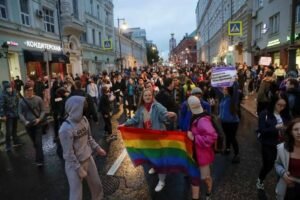Shocking Ban On LGBT By Russia
Russia’s Supreme Court has declared the “international LGBT public movement” an extremist organization, subsequently banning its activities across the country. The ruling, initiated by the justice ministry, has sparked concerns about the escalating repression of the LGBTQ+ community in Russia.
The decision, delivered behind closed doors but with reporters present, highlights the absence of any legal entity representing the alleged movement. This absence raises questions about the basis for such a ban on an organization that, as some argue, doesn’t even exist. The lack of representation from the defendant’s side during the hearing adds another layer of controversy to the court’s decision.
Past Decisions Related to LGBT
This move comes three years after a constitutional amendment explicitly defined marriage as a union between a man and a woman, reinforcing the non-recognition of same-sex unions in Russia. The recent ban has left the LGBTQ+ community in a state of panic, with reports of individuals seeking urgent evacuation from their own country, illustrating the chilling impact on personal freedoms.
Sergei Troshin Expressed Concerns About Decision
Sergei Troshin, a municipal deputy in St Petersburg who openly came out as gay last year, expressed his concerns about the potential consequences of the ruling. He anticipates that individuals deemed LGBTQ+ activists could face lengthy prison sentences for merely “participating in an extremist organization.” This, he argues, amounts to real repression, pushing many within the community to consider leaving Russia.
LGBTQ+ Communities Challenges in Russia
Russia’s Gay community has faced increasing pressure in recent years. The 2013 law prohibiting the “propaganda of non-traditional sexual relations” amongst minors has been expanded to encompass all age groups. References to LGBTQ+ individuals have been systematically removed from various forms of media, including books, films, advertisements, and TV shows. Even a South Korean pop video had its rainbow altered to comply with Russia’s stringent “gay propaganda” law.
Vitaly Milonov’s Defended Decision
Vitaly Milonov, a prominent and openly homophobic member of the ruling party, United Russia, defended the ban by asserting that it targeted the political agenda of the international LGBTQ+ movement. Milonov’s comments reflect the broader narrative promoted by the Russian authorities, painting LGBTQ+ activism as a Western imposition contrary to so-called traditional family values.
Milonov went further, expressing a desire to ban the six-color rainbow flag, a symbol widely recognized as representative of Pride. He framed this move as part of a broader effort to combat what he perceives as a threat to the traditional family structure. This sentiment aligns with the Kremlin’s embrace of conservative ideology, portraying LGBTQ+ activism as foreign and hostile to Russian values.
LGBT: A Thread To Society?
Under the leadership of Vladimir Putin, Russia has increasingly embraced conservative values, portraying the Gay community as a potential threat to the nation’s moral fabric. The crackdown on LGBTQ+ rights is often presented as a defense against Western influence, contributing to an “us versus them” narrative that resonates with a conservative segment of the Russian population.
The timing of this controversial court ruling has led some to speculate about its connection to the upcoming presidential election in March. Some believe that by framing the community as an “artificial enemy,” the authorities are seeking to divert attention from pressing issues and capitalize on anti-Western sentiment. This calculated move, aimed at appealing to conservative voters, may serve as a distraction from other societal concerns.
LGBT People Are in Trouble
The impact of this decision on individuals within the community is profound. Maxim Goldman, who identifies as non-binary, described feeling rejected and forced to leave Russia on his final day in the country. Others, like Sergei Troshin, who has been an advocate for LGBTQ+ rights, fear potential criminal charges merely for expressing their views.
The prevailing atmosphere of fear in Russian society, where individuals must tread carefully to avoid legal repercussions, underscores the extent of the restrictions on freedom of expression. The ban on the supposed “international LGBT public movement” is not only an attack on an imagined entity but also a broader assault on the rights and identities of LGBTQ+ individuals in Russia.
Concern on Personal Freedom
As the international community observes these developments, the deepening crackdown on LGBTQ+ rights in Russia raises concerns about the erosion of personal freedoms and the stifling of diverse voices within the country. The repercussions of this ruling extend beyond community, serving as a stark reminder of the challenges faced by those advocating for human rights and individual liberties in an increasingly restrictive environment.











Comments 1